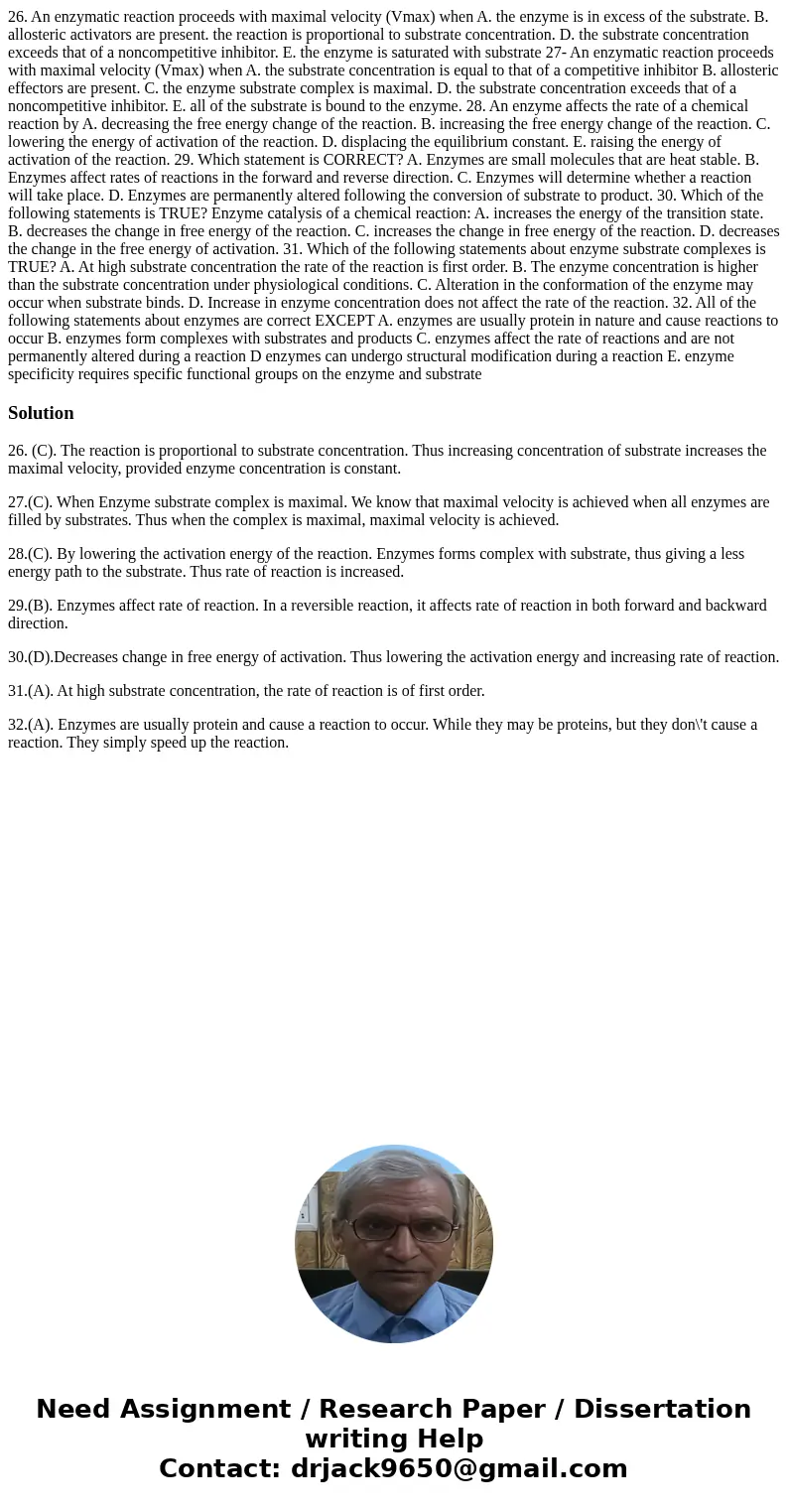26. An enzymatic reaction proceeds with maximal velocity (Vmax) when A. the enzyme is in excess of the substrate. B. allosteric activators are present. the reaction is proportional to substrate concentration. D. the substrate concentration exceeds that of a noncompetitive inhibitor. E. the enzyme is saturated with substrate 27- An enzymatic reaction proceeds with maximal velocity (Vmax) when A. the substrate concentration is equal to that of a competitive inhibitor B. allosteric effectors are present. C. the enzyme substrate complex is maximal. D. the substrate concentration exceeds that of a noncompetitive inhibitor. E. all of the substrate is bound to the enzyme. 28. An enzyme affects the rate of a chemical reaction by A. decreasing the free energy change of the reaction. B. increasing the free energy change of the reaction. C. lowering the energy of activation of the reaction. D. displacing the equilibrium constant. E. raising the energy of activation of the reaction. 29. Which statement is CORRECT? A. Enzymes are small molecules that are heat stable. B. Enzymes affect rates of reactions in the forward and reverse direction. C. Enzymes will determine whether a reaction will take place. D. Enzymes are permanently altered following the conversion of substrate to product. 30. Which of the following statements is TRUE? Enzyme catalysis of a chemical reaction: A. increases the energy of the transition state. B. decreases the change in free energy of the reaction. C. increases the change in free energy of the reaction. D. decreases the change in the free energy of activation. 31. Which of the following statements about enzyme substrate complexes is TRUE? A. At high substrate concentration the rate of the reaction is first order. B. The enzyme concentration is higher than the substrate concentration under physiological conditions. C. Alteration in the conformation of the enzyme may occur when substrate binds. D. Increase in enzyme concentration does not affect the rate of the reaction. 32. All of the following statements about enzymes are correct EXCEPT A. enzymes are usually protein in nature and cause reactions to occur B. enzymes form complexes with substrates and products C. enzymes affect the rate of reactions and are not permanently altered during a reaction D enzymes can undergo structural modification during a reaction E. enzyme specificity requires specific functional groups on the enzyme and substrate
26. (C). The reaction is proportional to substrate concentration. Thus increasing concentration of substrate increases the maximal velocity, provided enzyme concentration is constant.
27.(C). When Enzyme substrate complex is maximal. We know that maximal velocity is achieved when all enzymes are filled by substrates. Thus when the complex is maximal, maximal velocity is achieved.
28.(C). By lowering the activation energy of the reaction. Enzymes forms complex with substrate, thus giving a less energy path to the substrate. Thus rate of reaction is increased.
29.(B). Enzymes affect rate of reaction. In a reversible reaction, it affects rate of reaction in both forward and backward direction.
30.(D).Decreases change in free energy of activation. Thus lowering the activation energy and increasing rate of reaction.
31.(A). At high substrate concentration, the rate of reaction is of first order.
32.(A). Enzymes are usually protein and cause a reaction to occur. While they may be proteins, but they don\'t cause a reaction. They simply speed up the reaction.

 Homework Sourse
Homework Sourse